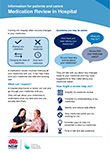Education and training
This page contains useful tools, guides and resources relating to Continuity of Medication Management, Medication Reconciliation, Best Possible Medication History and Medication Review.
The Clinical Excellence Commission acknowledges the contribution of the Continuity of Medication Management Expert Advisory Group, Medication Reconciliation leads, and colleagues across LHDs, SHNs and individual hospitals in the development of these resources.
Continuity of Medication Management resources
This module is available through the Health Education and Training Institute's My Health Learning platform (course code: 157075702) It is available for NSW Health staff and qualifies for up to 0.5 hours of CPD.
Medication Reconciliation resources
The Medication Reconciliation toolkit provides information, resources and quality improvement (QI) tools to support LHDs and individual hospitals with their medication reconciliation efforts.
As medication reconciliation processes vary across health services, resources may be adapted to suit local needs i.e. for initial implementation, to review and improve current practices or support current activity.
There are two audit tools and associated user guides available for services to use.
The first is a comprehensive audit tool which requires the collection of detailed data and provides an indication of the quality of the medication information in the patient record. An audit tool data spread sheet is provided to enter the collected data and to assist with data analysis.
A baseline audit summary template is also provided to assist in presenting baseline data.
The second audit tool is an observational tool that collects information on whether all components of continuity of medication management are evident for each patient.
There are also eMeds reports available for Cerner sites: (EM002 – Meds Rec Compliance Audit, EM003 – Meds Rec Current Inpatients and EM007 – Medication History Audit). Contact your local pharmacy department or eMeds application specialist for more information.
This framework assists services to formalise Med Rec processes. It outlines how these processes will benefit patients, and what action is required to achieve these benefits.
Refer to the Medication Reconciliation Toolkit for a step-by-step guide on how to use the following resources.
This readiness assessment tool assists QI teams to explore their current processes in order to determine practical and realistic changes that can be successfully implemented in their services.
This brief assists the QI team to build a case for improvement.
This guide assists services to form a QI project team and provides information on how to engage members and their ideal qualities and roles.
This guide assists QI teams to review current practice. The review will enable the project team to identify what they are doing well and recognise areas for improvement.
Other QI resources
The following posters have been developed to increase awareness of medication reconciliation. There are four designed for health professionals and one designed for patients. Posters can also be adapted and used as screen savers
Best Possible Medication History resources
The Best Possible Medication History webpage contains a presentation, videos and an interview guide to standardise medication history taking.
Nursing and Midwifery resources
Nurses and midwives play an important role in supporting Medication Reconciliation (Med Rec) processes to minimise medication errors and keep patients safe.
Please note that these resources can be adapted for other non-pharmacy professions such as prescribers and allied health members.
The Nursing and Midwifery Education Package contains face-to-face workshops and materials for in-house training. It complements the suite of existing Med Rec Education resources above.
Staff should first ensure that the package aligns with their organisation's existing procedures and policies around nurses' and midwifery staff's involvement in medication reconciliation. If unsure, staff can consult their line manager and/or Medication Safety representative or contact their local Drug and Therapeutics Committee.
- Education Package Fact Sheet
- Education Facilitator Handbook
- Education Participant Handbook
- Education Participant Surveys
- Education FAQ
- Med Rec Nursing & Midwifery 2017 Pilot Report
Med Rec Nursing & Midwifery workshop presentation
(Contact us for a PowerPoint version)
Med Rec Nursing & Midwifery HETI online codes for facilitator available for NSW Health staff.
- Workshop 1: The Case for Medication Reconciliation
Course Code: 197557236 - Workshop 2 Medication Reconciliation on Admission
Course Code: 197563085 - Workshop 3: Medication Reconciliation Beyond Admission
Course Code: 197563158.
Medication Review resources
This guide assists health service organisations and clinicians develop systems and processes to support conducting medication reviews for patients, in line with evidence and best practice.
Visit the Medication Review webpage for polypharmacy review resources.
This fact sheet provides information to patients and carers about the process and potential benefits of medication review in hospital. It is intended to be provided by clinicians to inpatients who have been identified for a medication review.

Medication Review in Hospital:
Information for patients and families
Order via Finsbury Green 1800 515 222
Stock code: NH700798 $30.65 + GST per pack of 100.
Patient Friendly Medication List examples
These patient friendly medication lists are ideal examples of the type of lists that should be given to consumers on discharge to support continuity of medication management.
